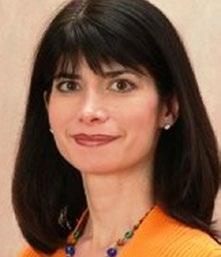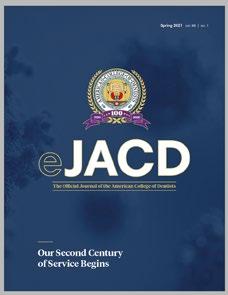
9 minute read
Communicating in Our Second Century
Dr. Gonzales serves as the Executive Director of the American College of Dentists and is a Federal Health Care Executive.
Theresa S. Gonzales, DMD, MS, MSS, FACD
Over the past one hundred years the American College of Dentists has leveraged every available technology in our ongoing efforts to communicate with the dental workforce community in our efforts to advance excellence, ethics, leadership and professionalism. From telegraph to telephone to television to electronic mail and podcasts, we have adopted and adapted to emerging technologies. Essential to our communication efforts has been the quarterly publication of the Journal of the American College of Dentists (JACD). The JACD is one of the oldest peer-reviewed dental journals. The JACD is a scholarly publication presenting proactive and informative perspectives on issues affecting the dental profession and society, together with enlightening features on areas such as leadership, ethics, governmental and private agencies, policy development, the American College of Dentists, and professional history. The journal has been continuously published since 1934 and its first editor was Dr. William John Gies. To fully understand the necessity for publishing this type of journal, one needs to look back at the issues that led to the founding of the American College of Dentists in the last century.
The decade of 1909 to 1919 marked the dawn of dentistry’s renaissance. A surge of interest brought concerted action by selected stakeholders while schools and examining boards helped guide dentistry to broader recognition as a profession. This era brought the advent of the focal infection theory under the prevailing influence of Drs. Mayo, Osler, Hunter, and other noted physicians and educators who held a broader interest in the biological phase of dental procedures. The Dental Educational Council of America also gained traction, ultimately with an initial classification of the dental schools.
In short, dentistry was emerging as a learned profession with all of the rights and responsibilities of this new status. The profession needed a publication to reliably capture the evolution of the profession. Existing publications of the time, with rare exception, were largely trade journals that lacked scientific merit. Into this backdrop entered Dr. William John Gies and he is justifiably credited as guiding dentistry’s emergence as a profession. More than most, he understood the basic tenets of professionalism and of advanced study. There have been eight editors since Dr. Gies. For the better part of three decades, Dr. David W. Chambers has served in this role.
Dr. Chambers was appointed Editor of the College in 1994, changing the mission of the Journal of the American College of Dentists to “identify and place before the Fellows, the profession, and other parties of interest those issues that affect dentistry and oral health.” Moreover, he substantially enhanced the format and readability of the journal. This publication is now regarded as one of the most respected journals addressing essential issues in dentistry. Dr. Chambers has the distinction as the longest-serving Editor of the College and for more than twenty-five years he has defined the role of the American College of Dentists as the conscience of dentistry. For the past several years, he has challenged us to broaden our communication strategy and provide for more two-way dialogue. He has championed a role for a communications director to enhance our communication efforts. He insists that we cannot rely on the last century’s style of communication for the next century’s issues. We must communicate differently and far more effectively and efficiently. As Dr. Chambers frequently reminds us “listening is often a neglected aspect of communication” and approaches to communication that provide opportunities for interpersonal interaction are far more likely to yield desired behavior change. Furthermore, we recognize that thoughtful strategic communication is essential to critical thinking, complex problem solving and social responsibility. In short, our Fellows, should be part of establishing an environment that is conducive to delivering effective communication activities. Dr. Chambers championed the role for a communications director. Upon the announcement of his planned retirement, the leadership of the College sought to acquire the talents of a Director of Communications.


The American College of Dentists Welcomes its First Director of Communications
Nanette Elster JD, MPH, FACD
Aposition description was drafted and widely circulated. A list of highly qualified candidates was prepared and after thorough vetting, the field was predictably narrowed. When inquiries were made at leading national and international ethics organizations, the name most often repeated was Nanette Elster, JD, MPH, which comes as no surprise to anyone who knows her. Nanette is a phenomenon and widely lauded in the discipline of health care ethics and health care advocacy.
Ms. Elster is an associate professor at the Neiswanger Institute for Bioethics and Health Policy, Loyola University Chicago Stritch School of Medicine. She has extensive experience in legal, public health and ethical issues related to women’s and children’s health. She has spoken nationally and internationally and is the author of numerous articles on the legal, health policy and ethical implications of a range of public health issues. She has appeared on such media staples as CNN, Good Morning America, the Today Show, NPR and Chicago Tonight.
Nanette served as the chair of the Special Committee on Bioethics and the Law for the American Bar Association. She is the legal consultant to the Committee on Bioethics for the American Academy of Pediatrics. She is the Manager of Ethics Outreach for the Council on Ethics, Bylaws and Judicial Affairs of the American Dental Association. She was elected in 2016 to serve on the executive board of the Association for Practical and Professional Ethics. In 2020, she was elected to a two-year term as board member of the Academy for Professionalism in Health Care (APHC).
Nanette was already well known and revered in the College. In 2017, she received an honorary fellowship to the American College of Dentists. This is bestowed on individuals who do not hold a dental degree but have significantly advanced the profession of oral health and have shown exceptional leadership in areas such as education, research, public health, administration, public service, or related fields of health care.
On October 1, 2020, The American College of Dentists acquired the extraordinary talents of Ms. Nanette Elster as the Director of Communications. Working in concert with the Executive Office, she began to develop her team as well as her communication plan for our second century. In 2021, the JACD will convert to a fully digital format and will be rebranded as the eJACD. This style of publication will provide more agility and adaptability to the publication effort. The first and obvious benefit is that a digital publication provides a way for subject matter experts to present curated content in real time. This also generates the enviable opportunity to create a complete picture of our organization, our values, and our intent to engage effectively with the Fellowship.
On October 1, 2020, The American College of Dentists acquired the extraordinary talents of Ms. Nanette Elster as the Director of Communications. Working in concert with the Executive Office, she began to develop her team as well as her communication plan for our second century. In 2021, the JACD will convert to a fully digital format and will be rebranded as the eJACD.

The 21st century will continue to be distinguished by new innovations designed to enhance information fluency and an increased dependency on technology. Thanks to this format, information can be delivered in an efficient way which really improves the usability and the end user experience. In addition, live streaming options will give authors the ability to communicate with their readers directly.
Over the holidays, I had the opportunity to engage with Nanette regarding her plans for the journal as well as her plans for communicating with our Fellows and friends of the American College of Dentists’ Family. Her responses to the posed questions are revealed below.
What are your plans for the eJACD as we turn the page to our next century of service to the profession and the public we serve?
The new digital version of the JACD is symbolic of the shift to the next century. I plan to have the eJACD serve as an information point, a discussion point, and a point of innovation. The engaging and scholarly materials will not change. I want to carry on the wonderful examples set by Dave Chambers. What will change is the expansiveness of viewpoints (age, gender, years of practice, location of practice, other professions) to better reflect the oral health care profession in this next century. Leadership, professionalism and ethics are pillars across health care professions and therefore looking at dentistry in this larger context will be something we strive for.
Do you plan to experiment with the format?
I do plan to experiment with the format. This, however, will require an engaged readership. We will want to know from our readers what is working and what is not. All issues of the eJACD will include academic peer reviewed articles, some issues will be theme-based, some will be in conjunction with other organizations, some may be guest-edited. We will also experiment with new features such as an ethics case discussion, profiles in professionalism— featuring a Fellow of the College, and book/film/television reviews.
How is communication different in this knowledge-based economy of this century?
Communication has changed dramatically. Attention spans are shorter, more information is available, un-vetted information abounds, and the flow of information moves very rapidly. In the new e-format JACD will have more agility and adaptability to meet these changes.
Who do you want to hear from?
I want to hear from a broad readership: fellows of the ACD, students, public health professionals, ethicists, new practitioners and seasoned practitioners. All feedback, positive and negative will be welcome. The eJACD should be a place for thoughtful dialogue and the exploration of a range of viewpoints.
How will you measure success with regard to communication strategy?
Success will be measured in many ways: reader feedback, number of new readers, engagement of existing readers, numbers of submitted articles, requests to guest edit, and when/where articles might be cited elsewhere.
Who do you consider to be great communicators and why?
A great communicator, to me, is clear, open to challenge, engages respectfully even amidst disagreement, and can make the complex seem straightforward without talking down to their audience. I can think of many who exemplify these traits but a few stand outs for me are: Socrates, Barack Obama and Ruth Bader Ginsburg.
The American College of Dentists welcomes Nanette to the family in the role as Director of Communications. We are truly delighted to have her join our team and we are confident that she will bring her unique style and enormous talents to the effort. Communication must be reimagined for the 21st century, and Nanette is committed to delivering on that promise. She contends that by truly listening we learn and, in doing so, we strengthen our ability to build not only an inclusive culture but also enhanced communication. It is famously reported that communication is the real work of leadership and as our second century of service begins, we will explore novel new ways to facilitate the conversations and lead from the front.










